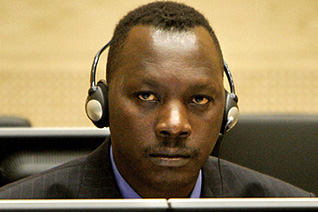
Submissions from Defence, Prosecution and OPCV on Lubanga reduction of sentence: On 21 September, in the Lubanga case, Defence, Prosecution and OPCV filed observations submissions to the Appeals Chamber on the reduction of the accused sentence based on Article 110 of the Rome Statute. Such a procedure allows the Court to decide a reduction of sentence, after having heard the person convicted, once “the person has served two thirds of the sentence, or 25 years in the case of life imprisonment […] if it finds “clear and significant change of circumstances sufficient to justify the reduction of sentence” or that “the early and continuing willingness of the person to cooperate with the Court in its investigations and prosecutions ; (b) The voluntary assistance of the person in enabling the enforcement of the judgements and orders of the Court in other cases, and in particular providing assistance in locating assets subject to orders of fine, forfeiture or reparation which may be used for the benefit of victims”. In this respect, Defence filed observations recalling Mr. Lubanga’s indigence and reiterating his will to take part to symbolic reparations programs or events. Defence confirmed that Mr. Lubanga was ready to participate – even before his release from detention – to ceremonies of excuses where he would meet, in person, victims and families of crimes for which he was convicted. It further stated that Mr. Lubanga agrees to a retransmission by local medias of the public hearing where he could reiterate such a commitment – an occasion to demonstrate his will be a committed partner towards reconciliation between communities and publicly take position against child soldiers’ enrolment. The Legal Representative for Victims Paolina Massina asked the three judges to consider all the OPCV observations and to maintain both Lubanga’s initial sentence and his detention. The OPCV further requested to reclassify some annexes of the Prosecution’s submission from ex parte to confidential. In response to both the Defence and the OPCV, the Prosecution stated that Lubanga’s sentence should be maintained. It argued that i) parties’ submissions show that no significant change in circumstances occurred since the ‘First Sentence Review Decision’ and ii) none of the party or participant asked for Lubanga’s early release. In addition, the Prosecution consider that Lubanga’s opposition to 474 applicants for reparations does not constitute ‘cooperation’ within article 110(4)(a) of the Rome Statute but rather is not assisting Trial Chamber 1 in its determination. Finally, the Prosecution considers that Defence merely repeats Lubanga’s earlier statements and that there is no basis to postpone the Panel’s decision – which should be taken on the currently available information. Mr. Lubanga was convicted on 14 March 2012 and sentenced on 10 July 2012 to 14 years of imprisonment. Such a verdict was confirmed by Appeals Chamber on 1 December 2014. On 19 December 2015, Mr Lubanga was transferred to a prison facility in the DRC to serve his sentence of imprisonment. The reparations proceedings started on 7 August 2012 and the next steps are the hearings and decision on victim reparations. (Defence Submission; OPCV Submissions ; Prosecution Submissions).
Source iclmediareview


Be the first to comment